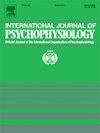Does outcome feedback similarly impact the processing of surprised faces in competitive and cooperative contexts? Evidence from ERP
IF 2.5
3区 心理学
Q3 NEUROSCIENCES
引用次数: 0
Abstract
Competition and cooperation are pervasive across diverse domains of human society, and outcome feedback in these contexts has been shown to significantly influence human emotional responses and behavioral strategies. However, there is limited understanding of the mechanisms through which outcome feedback in obstructive and supportive settings affects the perception of facial expressions of interactors. To address this issue, thirty-seven participants in this event-related potential (ERP) study completed a modified version of the Tetris game with randomly assigned interactors (cooperative supporter, competitive hinderer). After receiving outcome feedback (correct, incorrect), participants were asked to rate the valence of surprised faces which were assumed to be displayed by interactors. Behaviorally, surprised faces in supportive correct feedback contexts were rated as more pleasant, while those in obstructive correct feedback contexts were rated as less pleasant. The ERP results showed a significant main effect of outcome feedback on the FRN and LPPfeedback, with enhanced amplitudes for incorrect relative to correct trials. More importantly, face-related P1, N170, and EPN components showed significant interactions between interaction type and outcome feedback. Surprised faces in obstructive correct contexts evoked larger P1 amplitudes compared to those faces in obstructive incorrect contexts. Conversely, amplified N170 and EPN responses were observed for faces in supportive correct contexts compared to those in supportive incorrect contexts. For the LPPface, an amplified response to faces was observed in correct feedback contexts compared to incorrect ones, irrespective of the influence of interaction type. Altogether, these findings offer the first empirical evidence that feedback cues in obstructive and supportive contexts can interactively influence the top-down processing of facial expressions, shifting attention away from the suppression of aversive stimuli towards a focus on self-related positive information, thus providing insights into the neurocognitive mechanisms underlying the impact of complex social information on higher-order cognitive processes.
在竞争和合作环境下,结果反馈是否同样影响对惊讶面孔的处理?来自ERP的证据
竞争与合作在人类社会的各个领域都很普遍,这些背景下的结果反馈已被证明对人类的情绪反应和行为策略有显著影响。然而,对于阻碍性和支持性情境下的结果反馈影响互动者面部表情感知的机制,人们的理解有限。为了解决这个问题,在事件相关潜能(ERP)研究中,37名参与者完成了一个修改版的俄罗斯方块游戏,随机分配互动者(合作支持者,竞争阻碍者)。在收到结果反馈(正确的,不正确的)后,参与者被要求评价被互动者所展示的惊讶面孔的价。行为上,在支持性的正确反馈环境中,惊讶的面孔被认为更令人愉快,而在阻碍性的正确反馈环境中,惊讶的面孔被认为不那么令人愉快。ERP结果显示,结果反馈对FRN和lpp反馈有显著的主效应,相对于正确试验,错误试验的振幅增强。更重要的是,面部相关的P1、N170和EPN成分在交互类型和结果反馈之间表现出显著的交互作用。在阻碍性的正确情境中,惊讶的面孔比在阻碍性的不正确情境中,诱发了更大的P1振幅。相反,在正确的支持性情境中,与错误的支持性情境相比,N170和EPN反应被放大。对于LPPface,无论交互类型的影响如何,在正确的反馈环境中,与不正确的反馈环境相比,观察到对面孔的放大反应。总之,这些发现提供了第一个经验证据,表明在阻碍和支持环境中的反馈线索可以交互地影响面部表情的自上而下处理,将注意力从抑制厌恶刺激转移到关注自我相关的积极信息,从而为复杂社会信息对高阶认知过程影响的神经认知机制提供了见解。
本文章由计算机程序翻译,如有差异,请以英文原文为准。
求助全文
约1分钟内获得全文
求助全文
来源期刊
CiteScore
5.40
自引率
10.00%
发文量
177
审稿时长
3-8 weeks
期刊介绍:
The International Journal of Psychophysiology is the official journal of the International Organization of Psychophysiology, and provides a respected forum for the publication of high quality original contributions on all aspects of psychophysiology. The journal is interdisciplinary and aims to integrate the neurosciences and behavioral sciences. Empirical, theoretical, and review articles are encouraged in the following areas:
• Cerebral psychophysiology: including functional brain mapping and neuroimaging with Event-Related Potentials (ERPs), Positron Emission Tomography (PET), Functional Magnetic Resonance Imaging (fMRI) and Electroencephalographic studies.
• Autonomic functions: including bilateral electrodermal activity, pupillometry and blood volume changes.
• Cardiovascular Psychophysiology:including studies of blood pressure, cardiac functioning and respiration.
• Somatic psychophysiology: including muscle activity, eye movements and eye blinks.

 求助内容:
求助内容: 应助结果提醒方式:
应助结果提醒方式:


